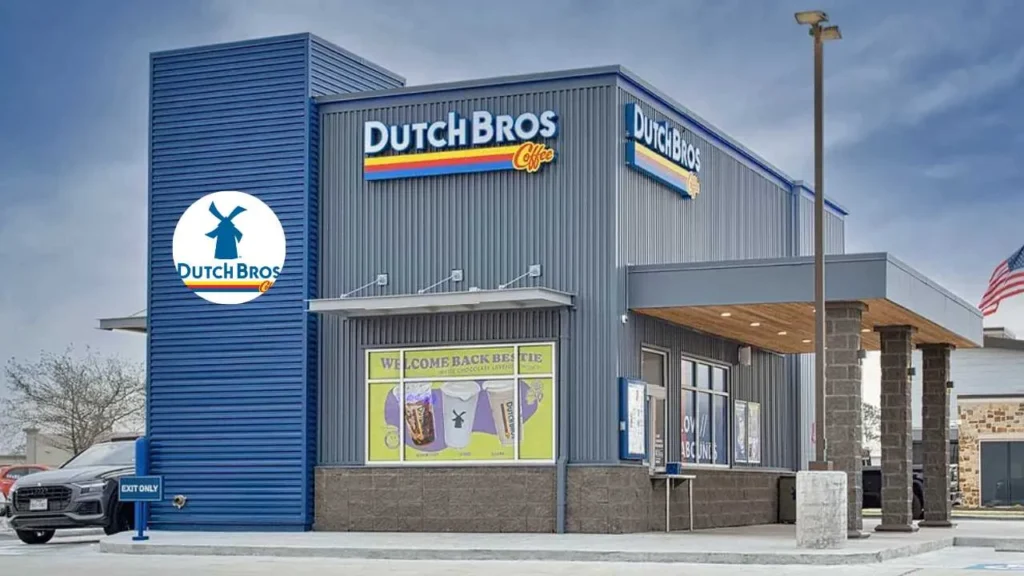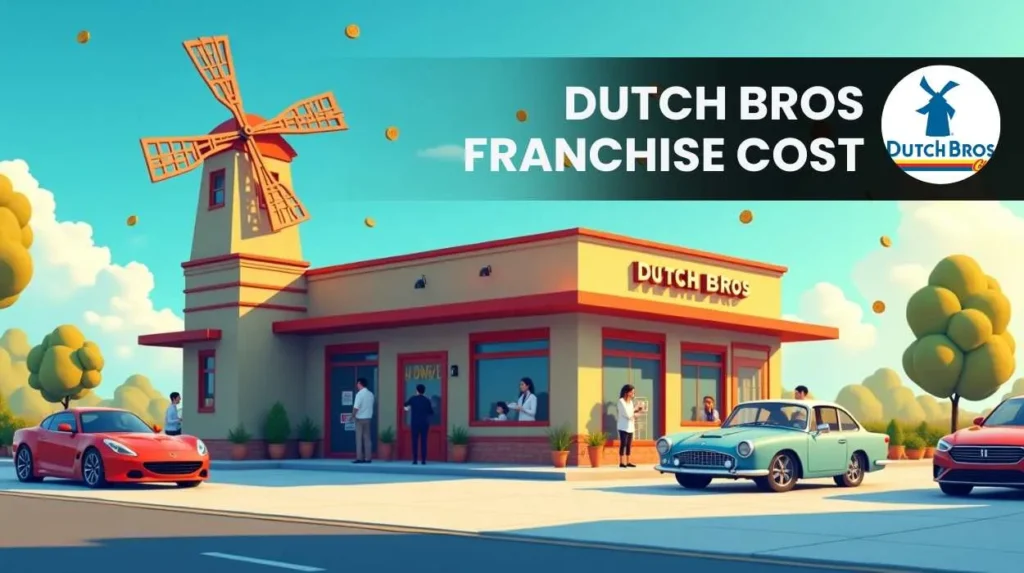With coffee, Dutch Bros started as a small cart on the street but has grown to be a cultural phenomenon with a large market share in the drive-thru coffee industry. The company has been an attractive opportunity for entrepreneurs worldwide thanks to its lively, energetic ambiance and committed clientele. Dutch Bros’ unique “broista” culture that focuses on sharing kindness and good vibes with every cup has set it apart from other firms.
Besides, its high profitability and aggressive growth have led many to want to know the price and profitability of a franchise offered by Dutch Bros. Its success is not debatable, with revenue in 2024 growing a staggering 32.6% to $1.28 billion, and an average unit volume (AUV) of nearly $2 million. But even with this tremendous growth, there is one vital bit of news that any potential investor should know up front: the company has fundamentally altered its franchising model.
This article delves into the historical costs and potential profitability of a Dutch Bros franchise model, while also providing the definitive information you need to know about how the company now operates.
A Brief History of Dutch Bros and Its Brand

Started by brothers Travis and Dane Boersma in 1992, Dutch Bros was born as a small coffee cart in Grants Pass, Oregon. The idea, which initially required just $12,000, turned within a short period of time into a multi-state company with a diehard fan base. The company’s reputation goes beyond the coffee it serves; it is the reflection of the brand’s distinctive culture, whereby the workers, or “broistas,” are not only permitted but expected to be acquainted with the customers as human beings.
That dedication to customer and community satisfaction is at the core of the Dutch Bros brand, and is one of the most significant reasons why it is one of the most identifiable and respected names in the drive-thru coffee industry.
To better visualize the expansion and size of the company, these are some facts and figures that could catch your interest about the Dutch Bros brand:
| Statistic | Details |
| Year Founded | 1992 |
| Number of U.S. Locations | Over 1,000 (as of mid-2025) |
| U.S. States Served | 20+ |
| Employees | Over 26,000 |
| Total Revenue (2024) | $1.28 billion |
| Average Unit Volume (AUV) | Approximately $1.97 million |
| Franchise Availability | None (internal growth model only) |
What Is a Dutch Bros Franchise & How It Works (in 2025)
There is news for all those looking for a Dutch Bros franchise opportunity: Dutch Bros does not sell new franchise units to third parties anymore. This is a significant departure from standard franchise models. Instead of selling new franchises to the masses, the company has turned to an internal growth strategy. This means that all new outlets are owned by the company or individuals who have risen through the ranks in the company.
This was a deliberate strategy, which was executed in 2017, to guarantee rigorous quality control and maintain the unique culture that defines the brand. So the sole way of becoming a regional operator or owner of a new store is through being an already existing employee who has demonstrated an absolute commitment to the fundamental values of the company.
Dutch Bros Franchise Cost Breakdown (Historical Data)
While you cannot buy a brand-new Dutch Bros franchise, knowing historical costs provides valuable insight into the investment required for this company. From the latest available figures in their franchise disclosure documents (FDDs), the total cost of the initial investment to open a Dutch Bros franchise was estimated between $150,000 and $500,000.
Here is the breakdown of the major cost categories:
- Franchise Fee: Initially, the franchise fee was $30,000. It is a single fee that, among other things, grants the user the right to operate under the Dutch Bros trade name, use the trademarks, and work with the business model.
- Build-out & Equipment: This is the most significant portion of the overall investment. The wide range accounts for variation in location size, build-out needs (e.g., ground-up construction vs. retrofitting an existing facility), and equipment.
- Licenses, Permits, Signage, POS/IT Systems: These “soft costs” include the legal and operational elements required, such as local and state permits, a recognizable sign, and technology to operate the business.
- Initial Inventory & Working Capital: Initial franchisees required capital for initial stock (coffee beans, syrups, cups, etc.) and sufficient working capital to fund expenses for up to three months of operation.
Ongoing Costs / Royalty & Fees
Once a Dutch Bros franchise was operating, it contributed to a series of repeat fees, familiar in franchising. This includes:
- Royalty Fees: Franchisees contributed a 5% royalty fee based on gross sales. The royalty is one of the franchisor’s primary streams of revenue and is contributed to support corporate assistance and continuous brand development.
- Advertising / Marketing Fees: In order to maintain a strong national and local brand identity, franchisees contributed to advertising accounts as well. Such fees, typically ranging from 2% of gross sales, were used for advertising promotions and marketing campaigns.
- Other Ongoing Expenses: Besides the franchise fees, the owners had to provide for ongoing operating expenses. These include utilities, employee salaries and benefits, ongoing inventory replenishment, lease or rent, and routine maintenance to keep the facility running in condition.
Financial Requirements & Eligibility
Historically, the future owner of a Dutch Bros franchise would have had to meet stringent financial and experiential qualifications. Besides this, the same applies to their internal operator program to date.
- Net Worth Requirements: The future owners had to have at least $500,000 in net worth.
- Liquid Cash Required: The potential owners should also have at least $150,000 in liquid cash, which is readily available funds.
- Employee Status Requirement: This is the most significant requirement these days. As mentioned, the only path to ownership is through being a current employee of Dutch Bros. The candidates must have been working with the company for at least three years and must be in a managerial role for at least one year.
- Location Requirements: The firm handled all location selection issues, ensuring new locations adhered to their strategic growth plans.
Profitability & Revenue Projections
Based on existing performance, Dutch Bros franchising is a very profitable venture. Here’s how:
- Average Sales: In 2024, the average gross sales at a Dutch Bros store per year were more or less $2 million. Such a high level of performance is a major indication of the health of the brand and the potential it has to bring huge profits.
- Net Profit Margins: After deducting all the operating costs, i.e., rent, labor, inventory, and franchise fees, the approximate annual profits (EBITDA) of an owner of a Dutch Bros franchise are around $240,000. This can vary based on location, volume of sales, and operational efficiency of the business.
Risks, Challenges & Considerations
Even though a Dutch Bros franchise can attract you with a lot of money, it is important that you as a potential owner know the problems and difficulties the franchise has. The most significant concerns for a franchise are as follows:
- Limited Access: The possibility of owning a franchise is now limited to a few people, thus this profitable business model is beyond the reach of most entrepreneurs.
- Fierce Competition: The drive-thru coffee market is highly competitive and crowded, with a constant fight to stand out over other big brands.
- Culture Maintenance: A continuous effort to uphold Dutch Bros’ unique, high-energy, customer-focused culture requires careful leadership and a dedicated crew, and can be a huge operational obstacle.
- High Employee Turnover: While Dutch Bros has an excellent work environment, the food and beverage industry as a whole is notorious for high employee turnover, which is an ongoing hiring and training issue.
- Real Estate and Traffic Vulnerability: The success of any drive-thru is highly reliant on real estate and traffic patterns so that a poor location can have a negative impact on the bottom line.
Conclusion
To sum it all up, the timeline of Dutch Bros’ development from a franchise-dispersed model to an internally fueled growth company is a signature of its identity in 2025. While archival data suggests a potentially profitable business with startup expenses of $150,000 to $500,000 and awe-inspiring profitability levels, the path to ownership is now a reserved opportunity for those who have built their career with the company.
Now, Dutch Bros no longer franchises out to the general public. The only entry point for shares in Dutch Bros’ financial success, defined by a virtually $2 million average unit volume (AUV) and an estimated owner-operator EBITDA of $240,000, is becoming a participant in its special “broista” culture and ascending its corporate ladder. This change of strategy will allow Dutch Bros to maintain its steadfast consistency with quality and customer experience, the cornerstones of its competitive advantage.
No matter how much it may not be a good investment for the common man, it is a reflection of the resilience of a unified brand identity as well as a committed workforce.
FAQs
1. How much does a Dutch Bros franchise cost?
Based on historical data, a Dutch Bros franchise investment ranged from $150,000 to $500,000 and included a one-time $30,000 franchise fee. Remember that new franchises are not being offered for sale to the public currently.
2. Is it profitable to own a Dutch Bros?
Yes, it is fairly lucrative to be an owner of Dutch Bros. With the median annual gross sales of about $2 million, the stores can earn plenty of money. After deducting all expenses, an average owner-operator can earn an estimated $240,000 annually in profit (EBITDA).
3. Can one open a Dutch Bros franchise if they are not an employee?
No, you can’t. Dutch Bros has a strict internal growth plan and never brings in outside investors. The only way to be a regional operator or owner is to be a company employee and be loyal to its operation and culture for a few years.
4. What is the Dutch Bros franchise profit per year?
Although profit fluctuates, the owner-operator of a Dutch Bros store’s average annual earnings (EBITDA) is approximately $240,000 from average gross sales of $2 million.
5. How much does a Dutch Bros vs Starbucks franchise cost comparison?
You also can’t purchase a Starbucks franchise since they employ a licensing format in some of their locations. However, comparing their past costs reveals that the Dutch Bros franchise was more affordable with respect to initial investment. In the past, Dutch Bros had an overall investment of $150,000 to $500,000, which was much less compared to some other big coffee franchises, such as Dunkin’ ($526,900 – $1,809,500).

